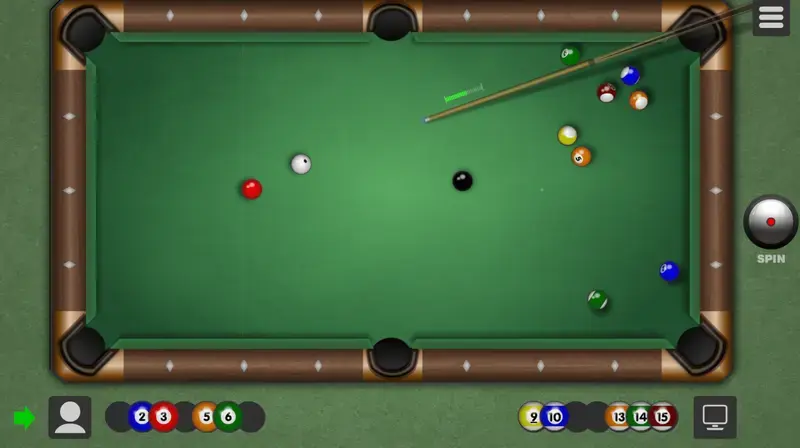Games With Different Names in the UK vs the US

For anyone spending time on either side of the pond, you are likely familiar with the various cultural differences between the United Kingdom and the United States, and you might marvel at how names can simply get lost in translation when crossing the Atlantic Ocean from London to New York.
It’s no different when it comes to media and entertainment like books, movies, card games, video games, and board games, either! So, let’s take a moment to delve into different names that exist in UK games vs American games, including why the names vary depending on the American English or British English language used and any further alterations that might occur in play between them.
British Blackball & American 8-Ball Pool
The game of pool itself came into prominence during the early 1900s, with a pyramid shape of 15 balls on a billiards table.
However, when the British company Brunswick-Balke-Collender produced a special set of pool balls that was half red and half yellow with a black 8-ball, the two games began to diverge around 1925. This special version was adopted throughout the UK, Ireland, and countries of the now-European Union, and “Blackball” was incredibly popular in those areas by the 1960s.
But in America, 8-Ball Pool became the international standard of ruled play and remains that way. The balls retained their original patterns of solid and striped colors, including yellow, blue, red, purple, and more, as well as the black 8-ball, and gameplay relied on a central break and calling the 8-ball pocket.
Overall, the rules of 8-Ball are more widely accepted than Blackball in the international and competitive circuits, but both games remain quite similar in practice. So, why not give it a try yourself with our online 8-Ball pool game!
British Cluedo & American Clue
Many in both the UK and America grew up solving mysteries with these games, but what about the name change?
The original UK games idea was created by the English Anthony Pratt and released in 1949 under the name “Cluedo”. Pratt sold the rights to American gaming company Parker Brothers during the same year, and the subsequent U.S. release rebranded this product as “Clue”.
While gameplay remains virtually identical, with a cast of characters, weapons, and locations for a grisly murder within a manor house, some national changes have been made over the past decades.
For instance, the UK character Miss Scarlett became Miss Scarlet in America, and Reverend Green switched to Mr. Green. During the last year and previous, changes also included a Mrs. White remake as she became Dr. Orchid in the US, with game developers referencing the possibly controversial connotations and “uninspired” nature of the character’s previous name.
When it comes to the naming convention itself, it seems to have a simple answer. Cluedo is a compound of Clue and Ludo, another popular English game. When it comes to the American version, though, the name was kept simplified– hence, it’s just Clue.
British Draughts & American Checkers
While draughts and checkers are certainly similar and share an ancestry, including the Royal Game of Ur of 3000 years ago, ancient Egyptian Alquerque, and 13th century French Fierges, they are still slightly different between the UK games and the American games– and not just linguistically.
Key changes between draughts and checkers include board size, pieces per side, and various capture constraints. For example, you can play British draughts on a 10 x 10 square board with 20 pieces, whereas American straight checkers rules use an 8 x 8 board with 12 pieces.
British Noughts and Crosses & American Tic-Tac-Toe
This classic elementary-to-high-school game can be played with pencils, chalk, online, or even on a Nintendo Switch. As such a widespread game that goes through periods of trending, let’s discuss the name change of Tic-Tac-Toe (or X’s and O’s) in North America and the British English version of Noughts and Crosses.
Both types come from the early 1st-century Roman game called Terni Lapilli– translated from Latin as “three little stones”– and have changed very little in terms of gameplay over the years.
However, around the mid-1800s, Brits adopted the name Noughts and Crosses to describe the primary playing shapes, with “nought” referring to the “O” shape. On the other hand, American players used Tic-Tac-Toe as the title in the 20th century, possibly referencing the clacking that traditional wooden symbol blocks made during play.
British Patience & American Solitaire
Finally, we have the difference between Patience and Solitaire in English and American English terminology, respectively.
Though Solitaire is a widely accepted term for solo card games that also include Klondike, Spider, and FreeCell, the name Patience is still used in Britain, Germany, and Poland.
Patience refers to the quality necessary to successfully conquer the game and possibly has roots in early card draw conventions by fortune-tellers in 1700s Europe and Scandinavia, where those curious about their future would have to wait as the cartomancer drew card after card for answers.
Alternatively, Solitaire is a reference to the solo nature of the game– and which many people can attest to, particularly when killing time with the classic green felt-backed Solitaire computer program!
When it comes to games night, whether you are in North America or the United Kingdom of Great Britain and Northern Ireland, it’s about the fun involved with a pal or two. So, check out our Classic Games Playlist, and consider signing up for Coolmath Games to earn XP!